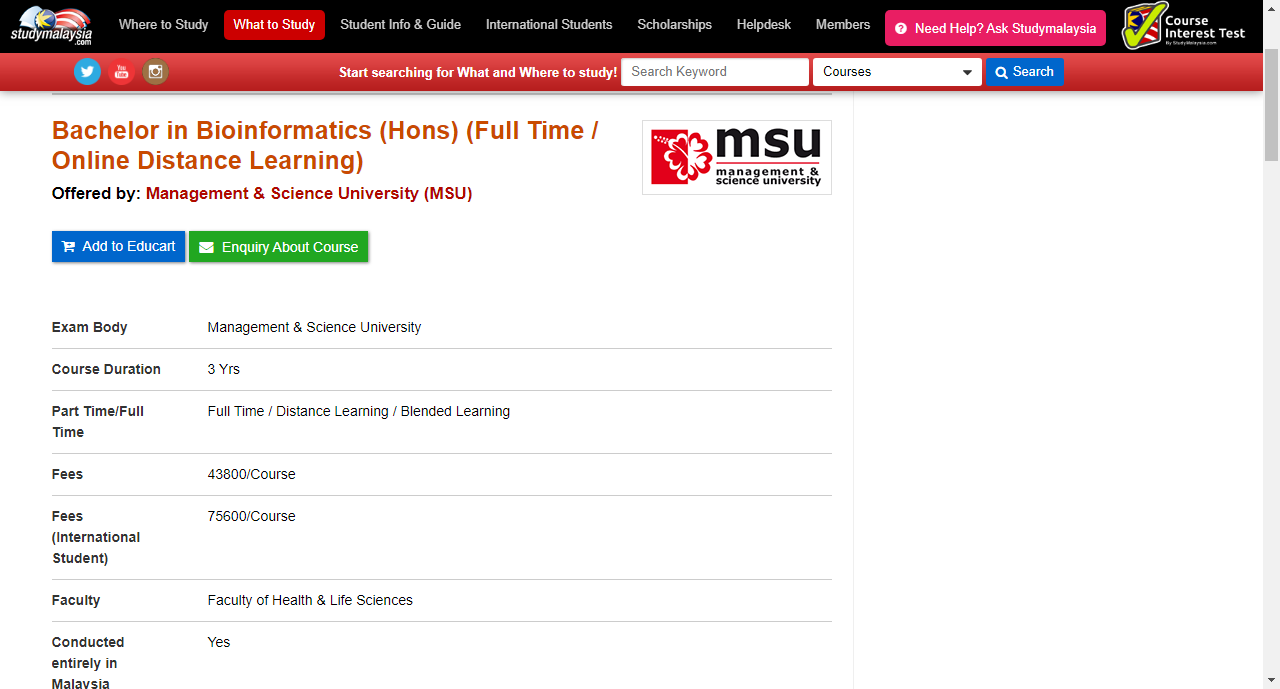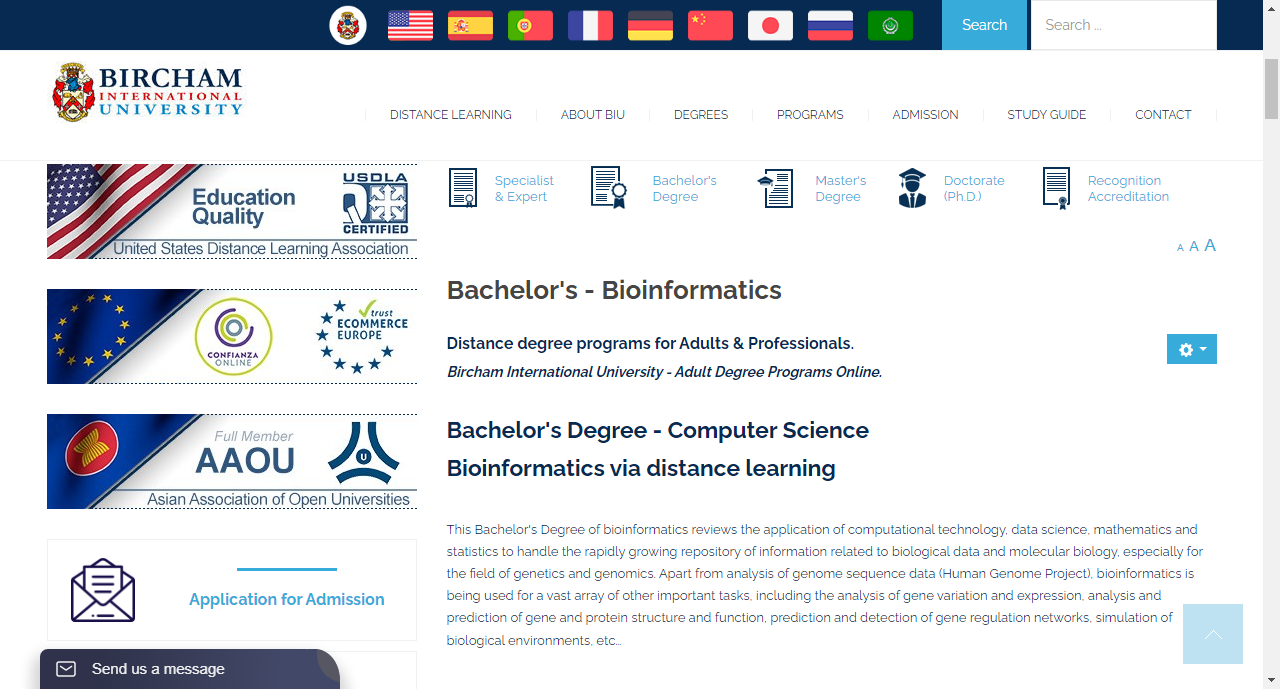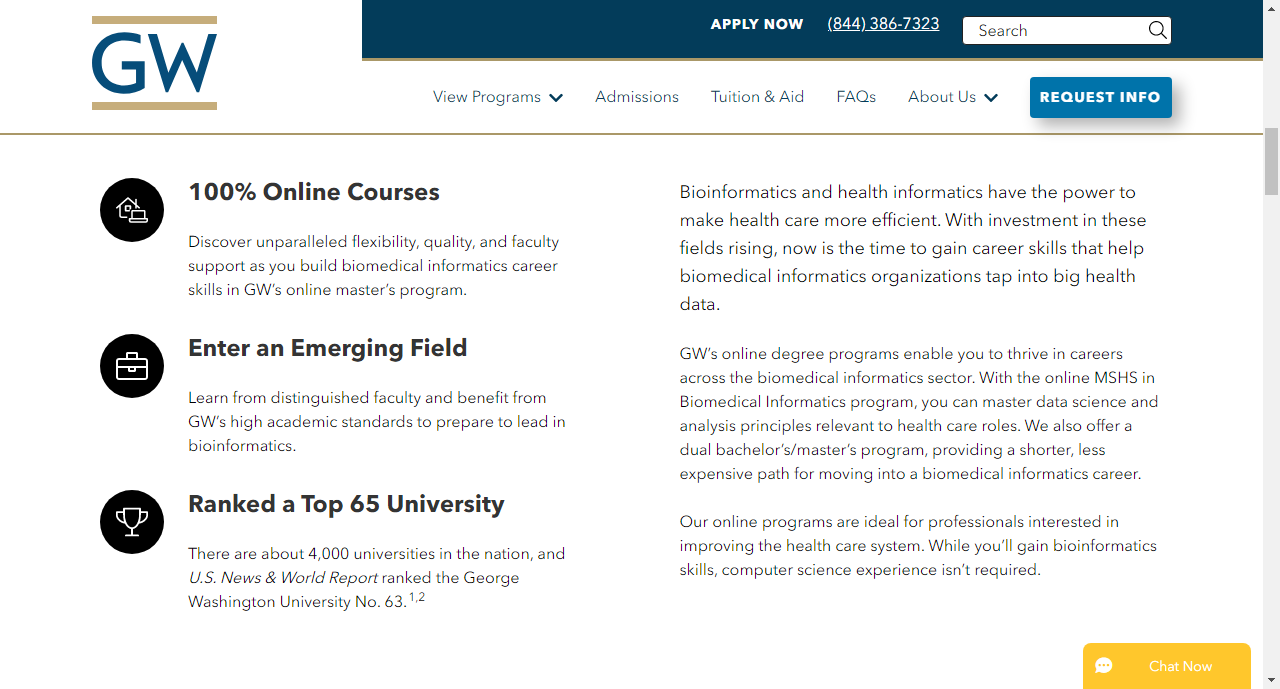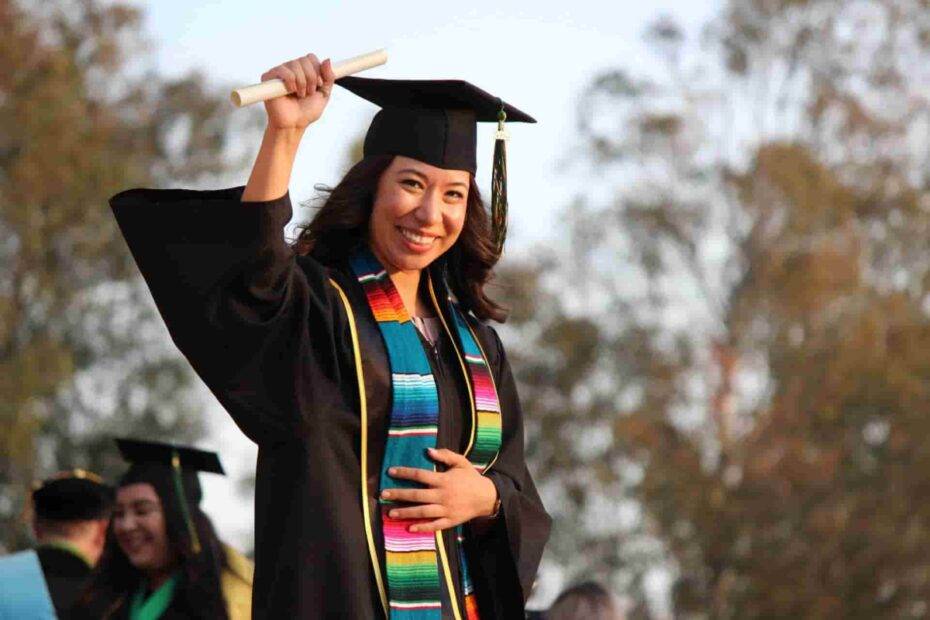Bioinformatics Bachelor’s Degree Online
Bioinformatics is a blend of multiple areas of study, including biology, data science, mathematics, and computer science. The discipline emphasizes the extraction of novel knowledge from vast amounts of biological data, and it necessitates that researchers be familiar with the instruments and procedures for gathering, processing, and analyzing large data sets.
You can study for a Bioinformatics Bachelor’s Degree Online from top universities like Management & Science University, Malaysia, Bircham International University, George Washington University, and a blended degree at UNSW Sydney. Studying for a Bioinformatics Undergraduate Degree Online might be challenging and you’ll need need to meet specific requirements before taking any of these programs online.
In this article, we will look at these requirements, the cost, and the curriculum which will assist you to make a better decision for your career journey in bioinformatics.
Bioinformatics Bachelor’s Degree Online
- Bachelor in Bioinformatics (Hons) (Full Time / Online Distance Learning)
- Bachelor’s – Bioinformatics
- Dual degree in Biomedical Informatics
- Bachelor of Engineering (Honours) (Bioinformatics)
Bachelor in Bioinformatics (Hons) (Full Time / Online Distance Learning)
Provider: Management & Science University, Malaysia
Duration: 3 Yrs
Delivery Mode: Full Time / Distance Learning / Blended Learning
Request Info:
About The School
The Management & Science Institution, also known as MSU Malaysia or just MSU, is a private university in Shah Alam, Selangor, Malaysia. The university was initially established in 2001 as the University College of Technology & Management Malaysia before formally becoming Management & Science University in October 2007.
MSU has twice received the national university classification of “Excellent Status University” and has been recognized by the Malaysian Ministry of Higher Education as the “Best Entrepreneurial Private University.” MSU provides programs as an applied and enterprise university.
Program Overview
Bioinformatics is a field of study that combines computer science and biotechnology. It processes biological data using computer science and information technologies. The potential for this science to advance agriculture, medicine, and other biologically-related fields is considerable. Your analytical and problem-solving abilities will be strengthened through cooperative, group-based exams and projects with the assistance of our lecturers. By taking part in the MSU Global Mobility Programme, you can broaden your scope of knowledge by studying for a semester or longer at one of MSU’s international partner universities. You will complete an industrial placement during your senior year to get practical work experience.

Curriculum
| Year one | Year two | Year three |
| E-Health and Ethics in Bioinformatics | Molecular Biology | Sequence and Structure Analysis |
| Cell and Tissue Biology | Data Structure and Algorithm | Biodiversity |
| General Genetics | JAVA Programming | Industrial Training |
| Biochemistry | Informatics Ecology and Environment |
Admission
- (i) Passed the STPM or its equivalent with a grade of C (2.0 CGPA) in two courses and credit in additional mathematics at the SPM level or a grade of C (2.0 CGPA) at the STPM level.
- (ii) Attained a credit in additional mathematics at the SPM level and passed STAM with Jayyid
- (iii) Completed matriculation or foundation with a grade point average of 2.00 and a credit in additional mathematics at the SPM level.
- (iv) Attained a Grade B in five (5) courses, including mathematics, to pass the UEC.
- (v) Attained a diploma in computer science, software engineering, information technology, information systems, or an equivalent degree, with a 2.50 cumulative grade point average (CGPA) and a credit in mathematics at the SPM level; candidates with a CGPA less than 2.50 but higher than 2.00 may be accepted with the condition that they pass a rigorous internal assessment.
- (vi) Candidates with CGPAs of 2.50 or higher and a Diploma in Science and Technology may be admitted after a thorough review and a Credit in Additional Mathematics at SPM level.
- (vii) GCE A-Level with a minimum of three (3) subjects completed
- (viii) South Australia Matriculation (SAM), minimum grade of 65-70%
- (ix) A minimum CPU (Canadian Pre-University Program) score of 80%
- (x) A certificate, diploma, or other credentials from a polytechnic or other institution recognized by the Ministry of Higher Education of Malaysia and certified by the Malaysian Qualifications Agency (MQA).
- (xi) Any additional credentials that are acknowledged as equivalent
Note: Candidates without a Credit in Additional Mathematics at the SPM level or equivalent may offer a diploma certificate that covers mathematics courses that are comparable to Additional Mathematics at the SPM level.
Fees
43800MYR/Course and 75600MYR/Course for International Student.
Bachelor’s – Bioinformatics
Provider: Bircham International University
Duration: 1 to 3 years.
Delivery Mode: Online
Request Info:
About The School
As a result of formal education’s failure to address the true pedagogical requirements of adult distance learning higher education, Bircham International University was founded in 1992. Bircham International University is a decentralized, multi-structured global educational network.
BIU offers courses in 9 languages: English, Spanish, French, Portuguese, German, Chinese, Japanese, Russian, and Arabic. Based on its relevance on a global scale, Bircham International University’s ranking may be regarded as being among the top ten.
All information pertaining to the distance learning degree programs is provided in English, while you are permitted to submit the necessary assignments in other languages with permission and upon request. Without severely affecting the adult student’s professional life, curricula are created to match their needs. The student will be expected to produce reports regarding the prescribed textbooks in order to assess the success of his or her academic program.
Program Overview
This bioinformatics bachelor’s degree examines the use of computer technology, data science, math, and statistics to manage the continuously expanding reservoir of data pertaining to biological data and molecular biology, particularly for the discipline of genetics and genomics. Bioinformatics is used for a wide range of other significant tasks in addition to the analysis of genome sequence data (Human Genome Project), such as the analysis of gene variation and expression, the analysis and prediction of gene and protein structure and function, the prediction and detection of gene regulation networks, the simulation of biological environments, etc.

Curriculum
Courses list (each subject accounts for 3 academic credits):
1 BIU Earned Credit = 1 USA Semester Credit (15 hours of learning) = 2 ECTS Credits (30 hours of study). You may study any subject as an independent online continuing education course.
- Computer Technology
- Computation & Data Structure
- Data Science
- Molecular Biology
- Genomics
- Molecular Genetics
- Molecular Cell Biology
- Data Analysis
- Numerical Optimization
- Applied Statistics
- Bioinformatics
- Scientific Research
Admission
Remark:
The program is entirely based on textbooks.
Adults who are over the age of 23 are eligible for admission.
Minimum prerequisites for general education: 40 credits.
For purposes of getting a bachelor’s degree online through distance learning, a minimum of 40 credits should be transferred from previous coursework.
Admission requirements for distance learning degrees at Bircham International University vary depending on the faculty and the major. In order to be admitted, a minimum of 30% of the total credits needed to complete the requirements of any adult degree program must be transferred from prior coursework or approved by professional experience. The total number of credits needed for the distance learning degree program can be transferred from professional and life experience up to a maximum of 20% of the time.
You must request an official Application for Admission form through email or mail from Bircham Distance Education University, fill it out, date it, and sign it in order to be considered for admission. This form is available for download on the website. Send the included documents to the school’s address. You can email this application in PDF format together with any attached materials.
All applicants must:
- Fill out the application for admission
- Submit one ID-sized photo
- ID card or passport
- Date and sign the application
All Bachelor’s, Master’s, & Doctorate applicants also must:
- Attach a Curriculum Vitae (Resume)
- Submit a registration Fee of 200 €uros or 250 US$ (contact BIU Office for payment details)
- Include copies of diplomas, transcripts, and relevant documents
- Include any additional program proposal, scholarship request, etc. (optional).
Fees
Min. 3.510 Euros (4.420 US$) … Max. 6.800 Euros (8.700 US$).
Dual Degree In Biomedical Informatics
Provider: George Washington University
Duration: 4-5 years
Delivery Mode: Online
Request Info:
About The School
The George Washington University (GW), which was established in 1821, is situated in Washington, D.C., the nation’s capital and the center of business, science, international law, and healthcare.
Each of their online health science programs is created in collaboration with top organizations and is based on a developing topic. With GW, you’ll get access to outstanding possibilities, relevant knowledge, and education unlike any other.
Program Overview
Health informatics and bioinformatics have the potential to improve the effectiveness of medical care. The time is now to acquire employment skills that enable biomedical informatics businesses to access massive health data since investment in these sectors is on the rise.
You can prosper in employment across the biomedical informatics field thanks to GW’s online degree programs. With the help of the online MSHS in Biomedical Informatics program, you can learn data science and analysis concepts that are pertinent to positions in the medical field. We also provide a quicker, less expensive route into a job in biomedical informatics with our dual bachelor’s/ master’s degree.

For professionals interested in enhancing the healthcare system, our online programs are perfect. Even though you’ll learn bioinformatics techniques, computer science expertise is not necessary.
You can use biomedical data to support clinical decision-making and support the administration of clinical trials and related clinical research investigations thanks to GW’s dual degree program. You can save the time and expense required to get a master’s degree by taking up to nine graduate credits while working on your Bachelor of Science in Health Science in Clinical Research Administration.
By transferring 45-60 credits, you can earn a bachelor’s and master’s degree after taking 29-44 courses at GW. Additionally, by completing this online course, you will meet a requirement for the Society of Clinical Research Associates (SCRA) or Association of Clinical Research Professionals (ACRP) professional accreditation (SOCRA).
Curriculum
Total credits needed: 147
You will learn about clinical research procedures and practices, health equity, bioethical concerns, clinical and translational research, the management of clinical trials, and more in the coursework for the dual BSHS/MSHS in Clinical Research Administration/Clinical and Translational Research degree program.
You can finish this degree program in four to five years and substitute some of the hours of professional experience needed for a number of certifications offered by the Society of Clinical Research Associates (SCRA) and the Association of Clinical Research Professionals (ACRP) (SOCRA).
BSHS CORE COURSES: The 9 graduate credits students take in lieu of undergraduate electives are: CTS 6261, HSCI 6263, and HSCI 6264. For a complete breakdown of the curriculum visit the official website
Admission
To apply for the dual BSHS in Clinical Research Administration / MSHS in Biomedical Informatics, you’ll need:
Application fee: There is an $80 non-refundable application fee. Active duty U.S. military, current GW students, degree-holding GW alumni, current McNair Program Scholars, and graduates of minority-serving institutions are exempt from paying the application fee (MSI).
Prerequisite Coursework: A minimum cumulative and science GPA of 2.5 and 45 credits of college-level coursework earned at a regionally accredited institution of higher learning are requirements for applicants.
The following General Education courses (and credits) are prerequisites that must be taken before admission:
- 6 credits in English composition
- 3 credits in college mathematics (college algebra, statistics, or above)
- 3 to 4 credits in natural or physical science with a lab
- 6 credits in social sciences
- 3 credits in humanities
Also, candidates may apply to the program if they have finished the following requirements and have received admission to the Governor of Virginia’s Health Science Academy through the Alexandria County Public School system.
Candidates must have finished at least 24 credits of college-level courses.
Prerequisite courses for general education total 21 credits.
Enrollment in at least one course during the first fall or spring semester following high school graduation at a college or university with regional accreditation.
All candidates will also need:
- Transcripts from each college and university attended, in official form. A recognized foreign credential agency must assess all transcripts from countries other than the United States, including those in English.
- 3.3 GPA or above on a 4.0 scale for all previous college-level coursework
- Two letters of recommendation from a previous instructor or employer
- Resume/CV
- Statement of purpose
Note: You may qualify for guaranteed admission to this program if you have an associate degree from a D.C., Maryland, or Virginia community college that participates.
International students
This program is ineligible for visas. One may apply to complete their rotation in the US if they are a permanent resident or have a valid visa (for work, for example). If they have a clinical site in their area that has been approved, international students may apply without a visa.
Additionally, candidates who are not nationals of the United States must present official test results from the TOEFL, the PTE Academic with an overall score of 68, or the academic International English Language Test System (IELTS) with an overall score of 7.0
International applicants may be admitted without providing the aforementioned test results if:
- You are a resident of a nation where English is widely spoken.
- You obtained your undergraduate degree from a nation where English is both the official language and the medium of instruction.
- You obtained your bachelor’s degree from a school recognized by a regional accrediting body in the United States.
Fees
| Program | Credit | Cost/Credit | Total Estimated Tuition |
| Dual BSHS in Clinical Research Administration / MSHS in Biomedical Informatics | 87 | $745 | $64,830 |
Bachelor of Engineering (Honours) (Bioinformatics) in Australia ONLY
Provider: UNSW Sydney
Duration: Full-time (4 years)
Delivery Mode: Face-to-face (includes blended)
Request Info:
About The School
Located in Sydney, New South Wales, Australia, the Institution of New South Wales (UNSW), often known as UNSW Sydney, is a public research university. It is one of the original eight universities in Australia that make up the Group of Eight.
Research university UNSW was founded in 1949 and is now ranked 67th globally by Times Higher Education and 44th globally by QS in the 2021 World University Rankings. It is a part of the global network of research universities known as Universitas 21. With more than 200 universities worldwide, it has relationships for research and international exchange.
Source: Wikipedia
Program Overview
In bioinformatics, which combines computing with the biological sciences, methods are being developed for storing, extracting, organizing, analyzing, interpreting, and exploiting the vast amount of genetic data being produced. Large-scale information processing and analysis necessitates advancements in hardware and software systems.

The foundational fields of bioinformatics, such as biology (biochemistry, molecular biology, and genetics), computing (algorithms, databases, and programming), mathematics, and statistics are covered in this degree program. You’ll learn how to create and use software for tasks like figuring out which genes are impacted by particular cancer kinds.
Curriculum
Depending on the number of courses you select and your timetable, degree structures can change. To give you an idea, take a look at the following.
Your first year of study could include:
- Two introductory courses in Mathematics
- An introductory course in Physics,
- and an introductory course in Computing
A foundational course in the field of your choice of specialization is another option. You acquire the abilities needed for the remaining portions of your engineering degree in these courses.
The course “Introduction to Engineering Design and Innovation” (ENGG1000) is taken by all students. You’ll discover how engineers think in this course as you build solutions with constrained funds, time, and resources.
When you are in your second year, you will:
- Courses from your selected specializations
- Core courses to give you the fundamental knowledge in your area of interest
With a variety of core and elective courses, you’ll expand your knowledge in your third and fourth years. You must finish two General Education electives to receive your degree.
By taking various courses from faculties other than engineering, these courses assist you to widen your education by fostering cross-disciplinary thinking, cultivating a flexible approach, and improving your critical analytical abilities.
You must also complete 60 days of industrial training as part of this degree, which will provide you with some work experience before you graduate. With the help of this multidisciplinary educational method, which links students, academics, and business, you can gain the crucial technical and professional skills you need to succeed in your future job.
Admission
- International ATAR with a score of 85
- UNSW Foundation Studies GPA 7.5
- Great Britain General Certificate of Education (GCE A levels) with a score of 11
- International Baccalaureate Diploma (IB) with a score of 31
- Scholastic Aptitude Test (SAT) (after 2016) with a score of 1210
Depending on whether you come from an English-speaking or non-English-speaking background, you could be requested to produce proof of your English language ability in order to enroll in classes at UNSW. You can demonstrate that you meet one or more of the following requirements by offering proof
- University-level English courses and English proficiency exams
- Prior education in the English language
- Additional credentials, such as IELTS or TOEFL
Fees & Scholarships
- 2022 Indicative First-Year Fee, $49,600
- 2022 Indicative Fee to Complete Degree, $204,560
2022 Estimated First-Year Fee $49,600 2022 Estimated Fee for Degree Completion $204,560
The University reviews fees on an annual basis, and new fees become effective at the beginning of each calendar year. The suggested fees given below are for tuition alone and are based on an expected average; other fees and levies are not included. Depending on the enrollment year, the courses you choose, and whether or not your study load is greater than or less than 1 equivalent full-time student load, your costs will change (8 courses per year).
Read Also: Online PhD Programs in Artificial Intelligence
What Is The Difference Between Biostatistics And Bioinformatics?
The science of developing, carrying out, evaluating, and interpreting research targeted at advancing public health and medicine is known as biostatistics.
On the other hand, the science of creating and using computational algorithms and analysis procedures on massive amounts of biological data, like genetic sequences, is known as bioinformatics.
Together, they form the basis for research and decision-making in public health and are crucial for preparing the next generation of public health and medical professionals.
If you are interested in this field then continue reading to learn about the available bioinformatics bachelor’s degrees online.
Does Bioinformatics Have a Future?
Yes, the future of bioinformatics is promising.
Recent statistics from the US Bureau of Labor and Statistics show that from 2021 to 2031, it is anticipated that overall employment in the healthcare sector will increase by 13%, a rate that is significantly greater than the average for all occupations and will add almost 2 million jobs. Opportunities arise from the need to replace people who permanently leave their occupations, in addition to new positions from expansion.
Modern biology and medicine rely heavily on bioinformatics for the analysis of data. Bioinformatics is a field that combines biology with informatics as well as other disciplines such as drug design, genomics, proteomics, system biology, machine learning, structural biology, computational biology, and many more. Therefore, acquiring knowledge of bioinformatics at this time will definitely place you on the path to worldwide collaboration.
What Can I Do With a Bachelor’s In Bioinformatics?
Generally, as a junior bioinformatician with less experience, you can work in the pharmaceutical or biotechnology industry. You can also work as a biostatistician in the zoology or human biology department. You can also decide to pursue a master’s degree right up to a Ph.D. and work in academia or become a senior biostatistician or researcher.
In most cases career paths include:
- Pharmaceutical and health
- Agrotech
- Banking and Finance
- Computer security
- Bioinformatics
- Big Data and Digital Services
- Consulting
Large volumes of genetic data are often managed and analyzed by a bioinformatics expert. However, the environment in which data analysis occurs can differ greatly.
Working in the pharmaceutical and biotechnology fields often entails examining the human genome to find potential drug interactions with specific proteins in the body’s cells. Laboratories are common places for work to occur.
The analysis in biology and zoology concentrates on plant and animal genomes as well as terrestrial information like elevation and water availability, with a general focus on environmental protection. Engineers in bioinformatics may work in a lab or in the field.
Careers in bioinformatics in academia are connected to investigations that may not immediately have a commercial advantage but may be used to spur
See Also: Study MBA in Blockchain Management Online
Do Bioinformaticians Get Paid Well?
Given how swiftly technology is developing, it is not surprising that bioinformaticians’ incomes are rising and that their positions are climbing the list of the hottest, most future-proof careers. But what is the possible pay in this industry?
According to Glassdoor reports, the overall pay for a bioinformatician in the United States is estimated to be $127,064 per year, with an average salary of $104,248. These figures show the median, or the midpoint of the ranges, from Glassdoor’s unique Total Pay Estimate methodology, which is based on data about wages gathered from our users.
On the other hand, reports from Payscale provide a more conservative compensation report for bioinformaticians. According to their estimates, basic compensation ranges from $47,000 to $102,000, with a median pay of $70,000.
Lastly, according to salary.com, the average base salary for a bioinformatician is $87,050, with salaries ranging from $76,996 to $97,878. The range for total cash payments, which includes base salary and annual bonuses, is $77,103 to $98,003, with an average of $87,265.
Is Bioinformatics Easy?
It is neither tough nor easy but requires a deep understanding of the subject. Any subject can be interesting and easy to learn, provided you have a keen interest in learning the subject. But it is important that you are not under the impression that it is as simple as a walk in the park. It demands your dedication and time.
Bioinformatics is a vast subject whose studies are based on biology, fundamental physics, and biochemistry. Software is used in biological data analysis, and you will also perform computational analysis with biological data. If you are excellent at understanding the concepts behind biomolecules and have good analytical skills through software and programming languages, then it will be an easy subject.
On the other hand, if you are new to all the subjects that are covered in bioinformatics, then it might seem challenging. The most important thing is to be enthusiastic about learning something new every day. Just like any new skill, bioinformatics can be learned through study, research, and practice.
If you reside in one of the following nations, I advise you to pursue it: the United States, the United Kingdom, France, Germany, especially (western Europe), Japan, and India (Indian subcontinent), as these have established research and defined curricula.
Conclusion
Bioinformatics Bachelor’s Degree Online is rare, but if you are interested in starting off your career journey then you can by taking any of the programs above. Only a few universities offer completely online bioinformatics bachelor’s degrees, we will continue to update the list as we find more. Good luck!
